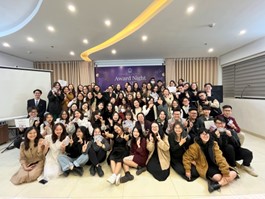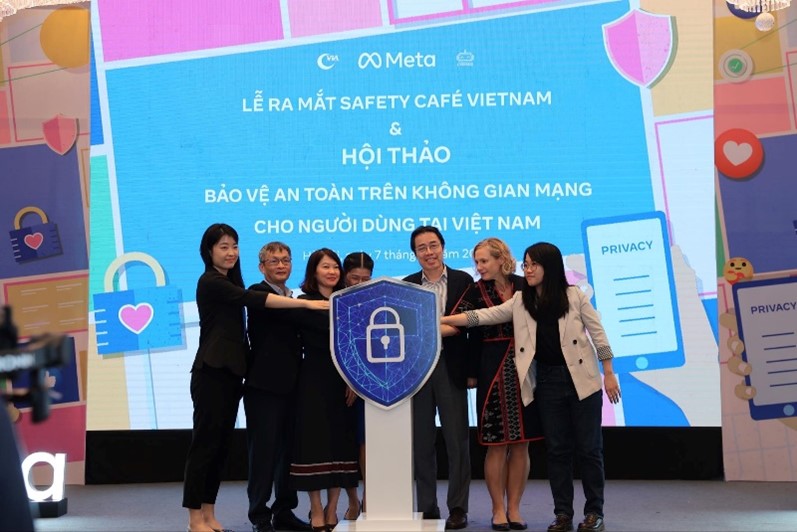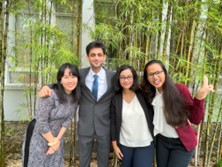[ALUMNI-INFO TEXT="Unlike the young go-getters of her age aspiring to join multinational companies, Nguyen Nhu Quynh has chosen to take the path less travelled to protect the children, teenagers, and youths of her home country from digital dangers. Her organisation, CyberKid, partners government agencies and tech companies to build responsible digital safety nets for minors and the vulnerable. Read on to learn how she hopes to bring the organisation to the rest of Southeast Asia by 2028."][/ALUMNI-INFO]
“A 12-year-old victim of a scam called us. Her naked pictures were plastered on a pornographic website and sent to her school,” recounted Nguyen Nhu Quynh to us. “We were very concerned she would self-harm or commit suicide.”
It is stories like the above that led Quynh to start CyberKid in her home country of Vietnam. “I noticed a proliferation of calls for help from minors during the locked-in periods brought on by COVID-19. Kids were thrown into isolation and turned to screens during the pandemic. The rise in screentime led to cyberbullying, cyber-harassment and online exploitation cases, which affected teens and children the most,” Quynh stressed.
She also noted an increase in scams singling out children. Kids in urban areas were targeted in financial scams. They were sent suspicious links that download malicious virus onto their devices. “I saw the advertisements on scams here in Singapore by the National Crime Prevention Council. The scams our urban kids faced were similar in nature. Meanwhile, children in the mountainous regions are exploited in human trafficking. They would be lured by prospects of work in casinos across the border, then kidnapped and forced into sex work.
In 2020, at just 26 years old, Quynh founded CyberKid to protect the digital safety and literacy of children, along with young adults. The organisation runs multiple programmes to aid minors. There is CyberSchool, which has curricula to support the 12 school grades in Vietnam. These are further categorised into urban and rural zones, as the scams targeting the children differ in nature.
[ALUMNI-QUOTES TEXT="As of April 2024, CyberKid had organised 1,638 Internet Safety classes for 75,985 students in 110 schools across 26 Vietnamese provinces and cities. Its social media platforms have an engaged community of over 30,000 followers and a total reach exceeding 2 million. They were also listed among the top 20 organisations (out of 1,180 submissions) in the “People – Empowering Lives and Communities” category of the SDG (Sustainable Development Goals) Digital GameChangers Award, presented by the International Telecommunications Union and the United Nations Development Programme (UNDP)."][/ALUMNI-QUOTES]
 The CyberKid Team – everyone in the photo is a member of the CyberKid team, including full-time, part-time, and intern employees.
The CyberKid Team – everyone in the photo is a member of the CyberKid team, including full-time, part-time, and intern employees.
Last year, CyberKid self-published a trilogy of books dedicated to educating students on self-protection and skill development for the digital age, with a distribution of more than 5,000 copies. They also have partnerships with the Ministry of Information and Communication of Vietnam, Meta, PwC, Palo Alto Networks, Vietnam Airlines, and GeoComply to deploy their programmes.
 "Safety Cafe" is co-organized by CyberKid and Meta in 2022 to increase awareness of digital safety on social media.
"Safety Cafe" is co-organized by CyberKid and Meta in 2022 to increase awareness of digital safety on social media.
Since 2021, Quynh has been appointed by the Ministry of Science and Technology to serve as the Co-Head of the Cyber Security Technology Village at TECHFEST, the largest annual national technology conference in Vietnam.
Besides CyberSchool, the other programmes include CyberHotline — a national helpline manned by a team of volunteers for people affected by Cyberbullying and harassment. CyberClass is a Technology Career Orientation programme to support students interested in furthering a career in technology and innovation. “We have about 10,000 students in the programme to date. We organise tours to tech companies as well as to universities known for their technology curriculum. The students get to experience work in the companies and see how classes are run in the universities,” expressed Quynh. “We do this because we would like to encourage more of our young adults to join the tech world in Vietnam. These are all provided free to the beneficiaries.”
All of the programmes are funded through the CyberHome programme, explained Quynh. “The three books that we published last year were sold at universities and schools to raise funds. We also sold board games,” she continued. In addition, CyberHome provides personalised career counselling services as well as digital literacy and safety at a premium. These services are provided to affluent families with children attending international or private schools.
Quynh is also personally drawn to technology. In 2021, she was offered a spot at LKYSPP to continue her Master in Public Policy, where she met Assistant Professor Araz Taeihagh. “He guided me a lot on emerging technology and its implications on society,” she offered. His help opened Quynh’s eyes on how to merge technology with CyberKid. “I’m very keen to explore new tech such as Artificial Intelligence (AI), blockchain, autonomous vehicles as well as the methodologies and frameworks to govern them,” Quynh opined. Her time at LKYSPP also taught her about government relations and how to maintain a united front with tech companies to develop win-win-win policies for CyberKid’s beneficiaries.
Even though she hasn’t done so yet, Quynh hopes to eventually build on the network of professors and experts from LKYSPP to develop a robust digital safety net for children, teenagers, and youths across Southeast Asia. It is this foresight that led to CyberKid transitioning this year from a dot VN (.vn) domain to a dot ORG (.org) one. “We plan to make a regional impact by 2028,” she shared.
 Quynh (left) with some of her classmates on campus
Quynh (left) with some of her classmates on campus
After four years of counselling, the grooming victim at the start of this piece is showing signs of recovery. “We helped to counsel the family and the victim first. We helped the girl transfer to another school, deleted her social media accounts and recommended that she take a year-long break from school. We last spoke to her a year ago and she seems to be getting better,” exhaled Quynh.
Parents across the region may also breathe a little easier knowing there are programmes such as the ones started by Quynh, with the safety of minors at the centre of their mission.